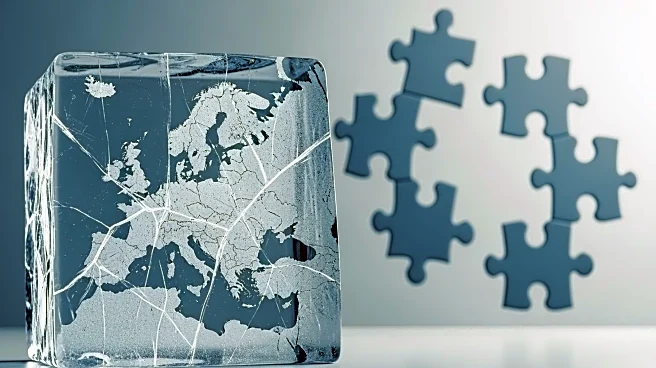What's Happening?
European Union leaders are convening in Brussels to discuss a significant financial plan aimed at supporting Ukraine amidst its ongoing conflict with Russia. The proposal involves providing Ukraine with a substantial loan, guaranteed by approximately
140 billion euros of Russian central bank assets currently frozen in Europe, primarily in Belgium. Ukrainian President Volodymyr Zelenskyy is actively advocating for this plan, emphasizing its importance in sustaining Ukraine's war efforts without burdening European taxpayers. The European Commission, the EU's executive branch, supports this initiative, arguing that Russia will eventually owe Ukraine at least this amount in a peace settlement. However, the plan faces opposition from some EU members, notably Belgium, due to concerns about potential repercussions from Russia.
Why It's Important?
The proposed financial support for Ukraine is crucial as it seeks to maintain its defense against Russian aggression. By utilizing frozen Russian assets, the EU aims to provide substantial aid without directly impacting its own financial resources. This move could set a precedent for how international assets are leveraged in geopolitical conflicts. The decision also reflects the EU's commitment to supporting Ukraine while balancing internal disagreements among member states. The outcome of this summit could influence future EU policies on asset management and international conflict resolution, potentially affecting diplomatic relations with Russia and the broader geopolitical landscape.
What's Next?
The European Commission is expected to receive authorization to draft a detailed plan for the proposed loan to Ukraine. Meanwhile, EU leaders are also set to approve a new sanctions package against Russia, which includes a gradual ban on liquefied natural gas imports. The EU's approach to these sanctions and financial support will likely be closely monitored by international stakeholders, including the United States, which has recently imposed its own sanctions on Russian oil companies. The EU's decisions could prompt reactions from Russia and influence ongoing diplomatic negotiations.
















